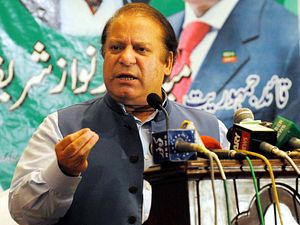Following all the drama of the Panama Papers leaks, Prime Minister Nawaz Sharif has returned to Pakistan from London, where he was for an alleged medical check-up.
His challenges now? Quite a few, in fact. He has brushed aside conspiracy theories surrounding his sudden departure, but confronts an impending PTI march at his home in Raiwind and a procession in the capital—all in addition to an increasingly bellicose media, narrowing its attention to the revelations regarding his wealthy family’s offshore activities.
It is not an ideal position for a prime minister to be in and for good reason too. As so many Pakistani politicians before him, he does come from London—and the United Kingdom’s capital is a place where some of the fishiest stories in Pakistani politics and sport alike have originated.
From the Lords spot fixing controversy in 2010, to the Imran Farooq saga, London has had plenty to offer for the Pakistani public in the way of controversy. The Pakistan Awami Tehreek and the Pakistan Tehreek-e-Insaaf meeting to explore strategies to hold the PML-N accountable for alleged rigging in the 2013 elections is one such example. Just as London hosts a potpourri of cultures from across the world, it also boasts a history of accommodating a potpourri of political gambits, gambles, and games from Pakistan.
The first anomaly, this time, is the prime minister’s medical condition. If one thinks back to recent history, something similar happened when President Asif Ali Zardari suddenly decided to depart to nearby Dubai amid a deepening political crisis, which fomented conspiracies regarding the reason for his departure. This time around, the situation is more profound and complicated. Sharif faces a truculent and resurgent Imran Khan back home; Khan feels reinvigorated after the Panama leaks, which just happen to help his party’s mission to pressure Sharif’s government to reign in the corruption and dishonesty found at the top of Pakistani politics.
London provides the PML-N and its collaborators an ideal place to reflect, regroup, and plan, mapping out effective strategies for how the party will deal with the Panama Papers.
The PML-N has suggested that a judicial commission will be formed under the chief justice of Pakistan, but only retired judges will be taken on as adjudicators. This tinkering has emboldened the PML-N’s opposition in the parliament, with the PTI pressing for a commission under the CJP and the leader of the opposition believing that Raza Rabbani should take the lead. A commission under the CJP should have been the first course of action for the ruling government. Amid these controversies, Sharif finds himself in London, as have other besieged Pakistani leaders in the past.
A false dawn for Pakistan in light of the leaks would be the worst of scenarios for the ruling government. Meanwhile, the military continues to outperform the civilian government in terms of curbing terrorism, with the recent launch of a major operation in Punjab and the completion of Operation Shawal. In another blow in a long list of blows for the PML-N government is the fact that Punjab, long their heartland, may be slipping away. (The schism with the military, of course, is not a revelation in the same way that the Panama Papers are.)
And amid all this, Sharif comes home from London to find his government in the middle of a quagmire.
Hamzah Rifaat is a 2016 Visiting Fellow at the Stimson Center and has worked as a Freelancer for the Friday Times, a newsweekly based in Lahore, since November 2012.
































